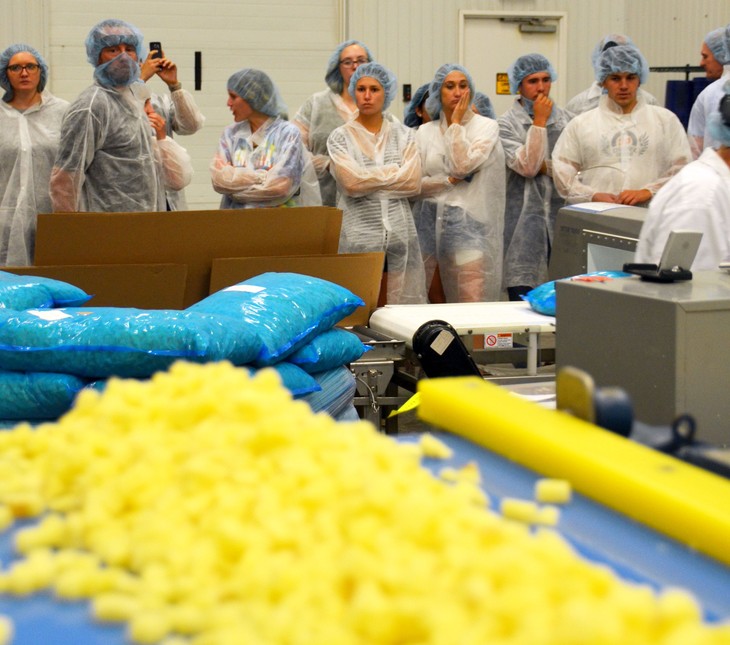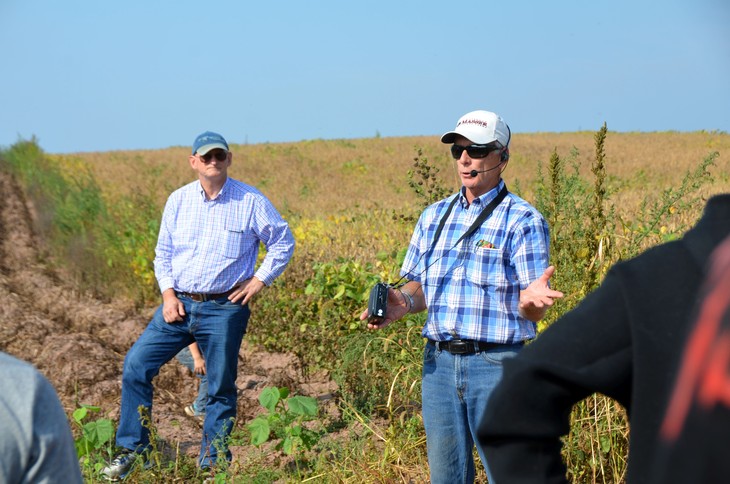Source: Pennsylvania State University
Sterman Masser Farms, Pennsylvania's largest potato-producing farm, knows consumers aren’t reaching for 5- and 10-pound bags of raw potatoes like they used to. Growing its business means adding more new and convenient products, so the company is eyeing a new spot in the grocery store’s produce department: the ready-to-eat, pre-cut fruits and vegetables section.
The national supplier is building upon its history of innovation to solve several problems. For example, cut potato flesh browns in 10 days—a fraction of the shelf life of a raw, whole potato.
Students in Penn State’s College of Agricultural Sciences are working on finding solutions to that problem, plus the challenge of winning consumers over to a new product.
 About 75 Penn State agribusiness students recently visited the Sterman Masser’s potato distribution facility near Sacramento, Pa., and Keystone Potato Products in Hegins, Pa. At Sterman Masser, potatoes are processed into ready-to-use products, such as the “Side Delights Steamable” line of triple-washed and pre-cut potatoes, available in seven varieties and sold in 1.5-pound, microwaveable pouches.
About 75 Penn State agribusiness students recently visited the Sterman Masser’s potato distribution facility near Sacramento, Pa., and Keystone Potato Products in Hegins, Pa. At Sterman Masser, potatoes are processed into ready-to-use products, such as the “Side Delights Steamable” line of triple-washed and pre-cut potatoes, available in seven varieties and sold in 1.5-pound, microwaveable pouches.
After the tour, student Kayli Kumanchik, a senior agribusiness management major, was thinking about trendy flavor profiles for new products and the healthy profit margins that could be made from convenience-based food products.
Jared Rice, a senior agribusiness management major, was impressed that the business was family-owned and by the sheer size of the operation and each facility. “Seeing that in person was pretty cool,” said Rice. The Keystone facility can produce 8,000 pounds of finished product per hour.
“Getting students out on a real-world case study allows them to see how companies execute against their goals and strategies to stay relevant in a constantly changing consumer environment,” said Dan Azzara, a professor of agribusiness and director of the college’s Entrepreneurship and Innovation Program. “The students saw examples of how Sterman Masser is innovating to bring new, more convenient products to market and to protect the environment and save on energy use.”
The Keystone processing facility is a zero-waste enterprise. For example, it converts methane from a nearby landfill to produce its own power and operates its own water treatment facility. Sterman Masser was one of the first growers to use pivot irrigation on potato crops.
For their agribusiness management assignment, students gathered information on potato growing and storage, Sterman Masser’s supply chain, and the company’s existing lineup of value-added potato products, including “A Cut Above” fresh-cut, low-water potatoes sold ready-to-bake into potato wedges, oven fries and chips.
Potatoes were grown throughout Pennsylvania in 1910. Potato production in other states expanded as producers added irrigation systems. Now, Pennsylvania is within the top 15 potato-producing states in the U.S. The state is No. 1 in processing potatoes for snack food and chip processing.
Students were surprised to learn that Sterman Masser sources potatoes from outside of Pennsylvania and that it handles 20 varieties of potatoes. The company grows 10 percent of its potatoes and sources from East Coast states from Florida to Maine, plus Michigan, Oregon and Washington.
Sterman Masser farms 6,000 acres. Its potato packaging and warehouse operations pack and distribute more than 350 million pounds of potatoes each year.
 For Rick Roush, dean of the College of Agricultural Sciences, the day trip was a goal realized. He has been eager to demonstrate to students how a traditional business can innovate to be a leader in its category.
For Rick Roush, dean of the College of Agricultural Sciences, the day trip was a goal realized. He has been eager to demonstrate to students how a traditional business can innovate to be a leader in its category.
Innovation doesn’t always mean a “home run” or “gee whiz” invention, Roush noted.
“Innovation can be an integration of many things,” he said. “Everything at Sterman Masser has been used somewhere else, but the Masser family spotted it, put it to use and combined many innovative things in one facility, in one very traditional business.”
Focusing on innovation is one of the college’s strategic goals, along with helping students to think like and consider becoming entrepreneurs—regardless of whether they own the company. Students can take entrepreneurship and agribusiness classes and tap other resources, such as pitch competitions and mentoring, through the Entrepreneurship and Innovation Program.
Aboard the “spud bus,” students learned about growing and handling potatoes from professor Barbara Christ, an expert in potato breeding and disease management. Known informally as the “spud lady,” Christ is a former interim dean of the college, former head of Penn State’s Department of Plant Pathology and currently a special assistant to the deans.
Students also saw a harvester from Spudnik, which can gently dig potatoes from the field 12 rows at a time, and met Keith Masser, company chairman and CEO. Students asked many questions throughout the day of company principals and owners, members of the Masser family.
Masser, the former president, is the son of founder Sterman Masser. Keith Masser, a member of Penn State’s Board of Trustees, and the board’s former chairman, graduated from Penn State in 1973 with a bachelor’s degree in agricultural engineering.
Helen Masser served as chief financial officer. Their children now lead the company. Dave Masser is president and Julie Masser Ballay is vice president and chief financial officer.
“We’re trying to take potatoes to that next level and stay relevant,” said Dave Masser, also a Penn State alumnus. He explained that the 10-pound bag of potatoes is fading fast as people gravitate to smaller amounts, a shift confirmed by the students who think of 10-pound bags as something their parents buy. Retailers are moving from 10-pound to 5-pound bags, Masser said.
Suppliers are trying to appeal to millennials—and the next generation behind them—with quick, easy-to-prepare products. The goal is to take the knife out of the equation, so the purchased potato can go from the refrigerator to the skillet, said Masser.
Attracting and retaining good talent and employees is key for the company, too, he said.
“The good thing about a Penn State degree in ag is that you will have a job when you leave there,” Dave Masser said.
Facing a real challenge is key to preparing students for career success, said Mark Gagnon, entrepreneurship coordinator in the College of Agricultural Sciences. “This mirrors the work students are going to do,” he said.